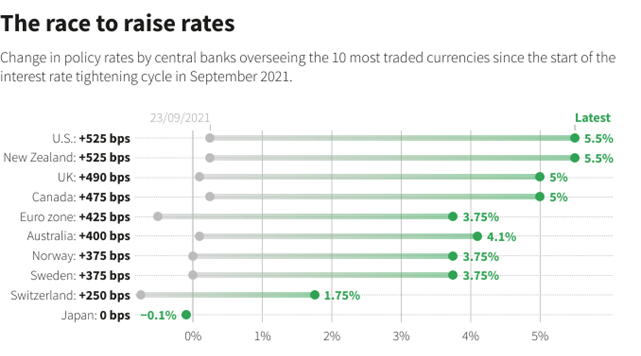Bank of England Poised to Raise Rates to 5.25% as High Inflation Persists
Key Highlights
- BoE Expected to Raise Rates to 5.25% from 5% on Aug. 3
- Repeat of June's Half-Point Rate Rise Seen as Possible
- UK Inflation of 7.9% Remains the Highest in the G7
- Markets and Economists See Rates Hitting 5.75% This Year
The Bank of England appears likely to increase interest rates by a quarter-point to 5.25% on Aug. 3, with the possibility of a repeat of June's surprise half-point hike, as inflation continues to outpace that of other major economies.
A Divergence Among Central Banks
While the U.S. Federal Reserve and the European Central Bank raised interest rates by a quarter of a percentage point this week, the market sentiment suggests that they might be nearing the end of their rate-tightening cycle. On the other hand, expectations regarding BoE rates have been fluctuating significantly since the last rate move on June 22. Investors are grappling with the question of whether the UK is facing a deeper inflation problem or if the rapid price growth will soon follow the trend seen in other economies, with a sharp slowdown.
Evaluating Future Rate Scenarios
Andrew Goodwin, Chief UK Economist at Oxford Economics, highlights that the trajectory of rates after August will hinge on the persistence of second-round effects, referring to the impact of last year's energy cost surge on wages and prices.
Expectations for peak BoE rates reached 6.5% on July 11 following data showing record wage growth. However, these expectations subsided after a larger-than-expected decline in consumer price inflation. Presently, investors are divided between a peak rate of 5.75% or 6% later this year or in early 2024.

Source from Reuters
Economic Implications
The surge in rate expectations has led to the highest mortgage costs since 2008, which, in turn, have put pressure on the housing and certain other sectors. Recent survey data revealed that private-sector growth had reached a six-month low this month.
The Fine Balance of Decision Making
In a Reuters poll, most economists predict a rate increase to 5.25% from the current 5% next week, with a potential peak at 5.75%. However, many analysts believe the decision is finely balanced.
HSBC economists expect a rate rise to 5.5%, marking the central bank's 14th consecutive hike, in order to send a strong signal on inflation. BoE Governor Andrew Bailey emphasizes the importance of curbing inflation and Deputy Governor Dave Ramsden notes that inflation remains "much too high" despite recent declines.
Inflation Figures and Labor Market Insights
Consumer price inflation in June dropped to 7.9% from 8.7% in July, a significantly larger decline than anticipated, aligning it with the BoE's forecast in early May, when markets predicted rates to peak around 5%. Nonetheless, this inflation rate is nearly four times the
BoE's 2% target and twice the rate of the United States.
Regarding the job market, wage growth excluding bonuses remained at an annual rate of 7.3% in the three months to May, the joint highest since records began in 2001. However, unemployment unexpectedly rose to a 16-month high of 4%, and employers advertised fewer job vacancies.
Perspectives on Data Interpretation
RBC economists Peter Schaffrik and Cathal Kennedy assert that the interpretation of the data is subjective and could be used to support either 25 basis points or 50 basis points increases. With the end of Silvana Tenreyro's tenure on the BoE's Monetary Policy Committee, fellow external member Swati Dhingra may be the lone advocate arguing that producer price inflation is a better indicator of future consumer price inflation trends than wage growth.
Annual producer price inflation fell to 0.1% in June, its lowest since December 2020, following a high of nearly 20% last July, which coincided with the peak of consumer price inflation at 11.1%.
Anticipating Fresh Forecasts
Alongside the rate decision, the BoE will update its growth and inflation forecasts. These are likely to be lower than the May forecasts due to higher market rate expectations, which significantly impact the overall forecast.
The International Monetary Fund's forecast for Britain's economy predicts a growth rate of 0.4% this year, making it the second slowest among the Group of Seven advanced economies, only surpassing Germany.
Emphasis on Inflation Persistence
In recent months, the BoE has placed less emphasis on its medium-term forecast. BoE Governor Bailey and Chief Economist Huw Pill have shifted focus towards addressing the risk of inflation persistence, which may not be fully captured in the central forecast. This shift has led some, including HSBC, to assert that if the BoE believed its own forecasts, it would be considering rate cuts rather than rate hikes.
In Summary, the Bank of England faces a delicate balancing act as it seeks to address the challenges of surging inflation while considering the nuances of economic data and projections. The upcoming rate decision and inflation forecasts will be crucial in shaping the path the central bank takes to stabilize the UK's economic landscape in the face of uncertainty.











Discussion